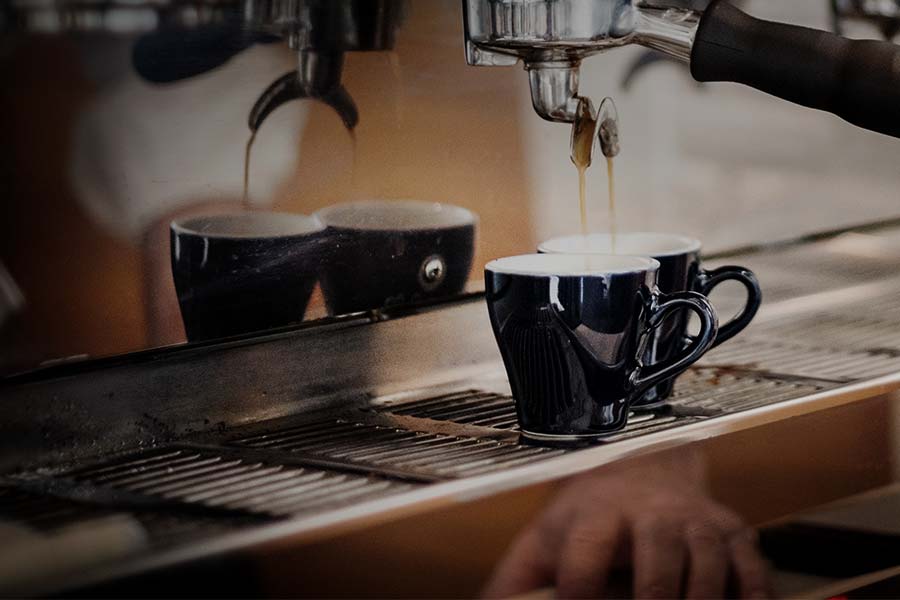You would be forgiven for thinking of us British as a nation fuelled by English breakfast tea, a bacon sarnie and an IPA. However, with consumers more likely to be found sipping a flat white on an oversized sofa, the coffee industry is booming and now is the perfect time to capitalise.
The UK’s Coffee Addiction
Life is busy. We’re working, hot-desking, socialising and commuting and coffee is being used to fuel, facilitate and free us away from this lifestyle. The UK has 24,000 coffee shops and we’re consuming on average two cups, per person, per day. That’s 95 million cups nationwide. And compared with only 70 million cups and fewer than 10,000 stores in 2008 that’s a lot of growth too, but where has it come from?
The Three Waves of Coffee
While many would attribute our coffee obsession with the arrival of Starbucks and their American counterparts in the nineties, it actually began in 1652 with the first UK coffee shop. A social hub for Londoners to drink, gossip and write, taste was secondary to the conversation, with many comparing the coffee to mud, damp and soot.
Palatable coffee arrived in the sixties, as we welcomed brands such as Nescafe and Maxwell House into our homes; beginning what experts term, the first wave of coffee.
Soon bored of home comforts, we ventured out into wave two: coffee shops. Between 1993 – 1997 UK coffee shop outlets increased by 847% and in 1998 Starbucks arrived: Freeze-dried coffee was out and grandes, lattes and shots were in.
We became hooked on Italian-style, barista-made espressos and quickly progressed into wave three: quality, customer service and ethics. Every step of the coffee process became important, from bean to cup to table - price, was secondary.
Where Are We Now?
Experts aren’t sure. Some think we’re still riding wave three and others believe we have bypassed wave four and entered wave five. What we do know is that the UK has a vibrant culture of coffee drinkers, willing to pay for great and responsibly sourced coffee. This has resulted in the coffee retail market exploding:
| Year | Number of coffee shops | Market size (£bn) |
| 2009 | 11,000 | 1.63 |
| 2010 | 14,022 | 5 |
| 2011 | 15,084 | 5.3 |
| 2012 | 15,723 | 5.8 |
| 2013 | 16,501 | 6.2 |
| 2014 | 19,035 | 7.2 |
| 2015 | 20,728 | 7.9 |
| 2016 | 22,845 | 8.9 |
| 2017 | 24,061 | 9.6 |
| 2022 forecast | 31,400 | 13 |
| 2025 forecast | 32,000 | 16 |
Coffee is one of the UK’s strongest performing sectors and, according to the Allegra World Coffee Portal, is worth a significant £9.6 billion. Last year alone, the market grew by 7.3% and saw 1,215 new coffee outlets - that’s a 5.3% increase.
The big chains (Starbucks, Costa and Caffè Nero) dominate the market, with a 52.9% share and 2326, 956 and 675 stores respectively. Last year alone, branded outlets achieved a record £4 billion worth of sales - a 10.5% increase from the previous year. Consumers prefer a consistent coffee experience from a brand they know and trust, as opposed to gambling £4.99 on an independent or 99p on a cheaper competitor.
Sparkling Coffee – The Future
The best thing is, we’re not even finished. Industry experts predict continued and robust growth, and with the following areas of opportunity, that’s not surprising:
Speciality coffee
A tall, half-caff, coconut milk latte, at 120 degrees with a caramel drizzle? From unicorn frappuccinos, dairy-free lattes and sparkling coffee, speciality coffee is huge, even with the heftier price tag. Global coffee chains, such as Starbucks, have the edge - with their global expertise, knowledgeable baristas, buying and marketing power.
Experience
People are willing to pay for convenience (drive-throughs), comfort (sofas) and office space (hot-desking). 16% of drinkers are already using shops daily as a desk, meeting room and lunch spot, while 80% are visiting weekly for networking, catching up and timing out. As coffee continues to become ingrained in our lifestyles, the opportunity to capitalise on providing different coffee experiences is vast.
Sugar-tax
Forgetting the multiple teaspoons of sugar in your frappuccino, coffee houses offer low-calorie and low-fat alternatives and coffee is regularly associated with various health benefits. Some chains like Starbucks are leading the way by reducing the sugar in drinks and pastries, as drinkers become increasingly concerned about nutrition.
Recycling
Recycling is a hot topic and consumers are searching for brands that improve their environmental credentials. Starbucks has seen 150% increase in reusable cup usage since implementing a 5p supplement and they’re working hard on (and investing £7 million in) creating an entirely disposable and compostable cup. If they achieve this, it will be industry-breaking.
Market Towns
The weekday city coffee obsession is set to spill into the weekend, marking an opportunity for big brands to expand into market towns. Especially as increasing alcohol taxes and decreasing alcohol consumption are causing 18 pubs to close, per week.
New Generations
Contrary to popular media belief, millennials aren’t spending their house deposits on flat whites and avocado flatbreads. Over 53s are the largest coffee consumers, providing an unexplored younger generation of potential coffee drinkers; a generation beginning to shun alcohol.
Shopping Habits
As e-commerce increases, we’re spending less of our weekends visiting shopping centres; providing us with more time to drink coffee, and brands with more empty retail spaces to occupy.
Rocket Fuel
To summarise, the UK coffee market is predicted to reach a staggering £13 billion turnover and 31,400 outlets by 2022. Coffee outlets will outnumber pubs by 2030 and increase to 32,000 by 2025. Yet still we don’t make it into the world’s top 20 coffee consumers, being beaten by the likes of the USA, Croatia, Finland and Germany - meaning there is strong potential in the UK coffee market for brands, franchisees and investors to explore.
